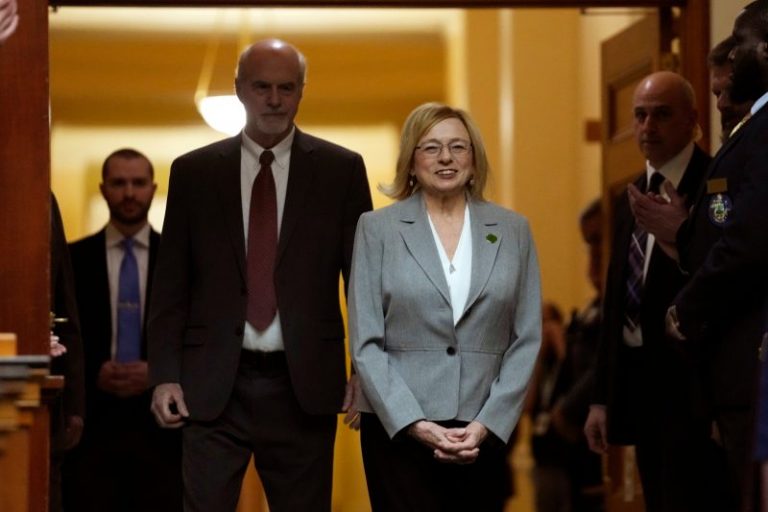
The state of Maine is embarking on a controversial experiment by partially decriminalizing prostitution in an attempt to eliminate exploitation of sex workers — adopting a model advocates say is a first in the country.
Gov. Janet Mills (D) signed a bill into law Monday that will eliminate penalties for those who sell sex while leaving in place laws against the purchase of it.
A former prosecutor and attorney general, Mills vetoed a similar measure in 2021 but approved the bill this year after a conversation with the famed author and feminist Gloria Steinem.
The approach, versions of which have been adopted in Canada and several European countries, is championed by many feminists who see it as the best way to stamp out demand for paid sex while protecting those who sell it because of economic need or because they are victims of trafficking. Among its opponents are conservatives who say it could impede efforts to help trafficking victims; also opposed to the partial decriminalization are those who advocate the full decriminalization of consensual sex work.
Cities and states nationally have been reevaluating how commercial sex should be treated under the law. Last year, California followed New York state in repealing a ban on loitering with the intent to sell sex.
In 2021, then-Manhattan District Attorney Cyrus R. Vance Jr. announced that his office no longer would prosecute other prostitution and unlicensed massage cases but would continue to pursue buyers and traffickers, joining Baltimore and Philadelphia.
But the exchange of sex for money remains illegal for sellers and buyers in the rest of the country, except Nevada, where some rural counties allow the operation of licensed brothels, according to the organization Decriminalize Sex Work, which seeks to change laws nationally.
“The point of this whole thing is to decrease the demand for commercial sex,” said Maine state Rep. Lois Reckitt (D), who sponsored the bill, adding that she wanted to do something to help women in the “revolving door” to get out of the sex industry.
Reckitt said police traditionally have used the women they arrested for prostitution to get to the people trafficking them. “Now they’re going to have to arrest the johns and lean on them to find out where the trafficking is coming from,” she said.
Reckitt, who will retire from the state legislature next year as she reaches her term limit, also sponsored the 2021 measure and said she was “surprised” by Mills’s recent change of heart.
Reckitt said Mills had previously voiced concerns that the bill could lead to an increase in violence and sex trafficking but apparently had been persuaded otherwise. Reckitt added that she thought Mills’s conversation with Steinem played a role.
A spokeswoman for Steinem confirmed she and Mills spoke about the legislation but deferred to the governor to provide details of the conversation.
A spokesman for Mills did not respond to requests for comment.
Tricia Grant, 44, who said she was trafficked into the Maine sex industry at 15 and now works with an anti-trafficking nonprofit organization called Just Love Worldwide, praised the new measure as a way to “stop law enforcement from continuing to arrest and put charges on the people being victimized.” Many who sell sex do so because of force or life circumstances, then struggle to obtain housing or loans because of their criminal records, she said.
“It’s a starting point for the big changes that are going to continue to occur, not only in Maine, but also in our country,” she said.
Another bill to seal the criminal records of women who have been convicted of prostitution is moving through the legislature. Both chambers of Maine’s legislature are controlled by Democrats. Opposition in the state House to the bill, which also upgrades the commercial sexual exploitation of children from a misdemeanor to a felony, came largely from Republicans.
“It has to be an all-or-nothing scenario for the police to be able to do their job,” said Rep. Jennifer Poirier (R), a member of the Maine House Judiciary Committee who opposed the bill.
Another GOP opponent, Rep. Rachel Henderson, said that outlawing the purchase of something but allowing the sale of it made no sense.
Others say they think the law does not go far enough.
Daniella Cameron, the deputy director of the Maine poverty outreach nonprofit group Preble Street, said that she supported the decriminalization of selling sex but that penalizing buyers “pushes the industry further from the margins” and therefore increases the risk of violence toward sellers. She said that truly addressing trafficking would require tackling root causes such as homelessness, poverty, hunger and immigration laws. The legislation carries no new funding.
The partial decriminalization approach — known by advocates as “the Nordic model” because it was first adopted in Sweden — is based on the notion that the exchange of sex for money is almost always exploitative and therefore should be eliminated.
To that end, Reckitt’s bill as originally introduced in March would have changed all references to “prostitution” in Maine’s code to “commercial sexual exploitation.”
“It denigrates all women when some women are being bought and sold,” said Reckitt, a former officer of the National Organization for Women who for three decades led an organization that fights domestic violence in Maine. “There’s no way to have total gender equality in this world if we’re selling women.”
Ariela Moscowitz, the communications director at Decriminalize Sex Work, which favors fully decriminalizing consensual sex work, countered that it is unrealistic to abolish the practice and that feminists who press for “bodily autonomy” in other realms of life should support those who choose to engage in it.
Multiple attempts have been made in other states to change the law around prostitution. Hawaii recently distinguished between buyers and sellers in law, although buying and selling both remain illegal. Some legislators in New York and Massachusetts also have been pushing competing measures that would adopt either the “Nordic model” or full decriminalization. The latter also is under consideration in Vermont.


Comments are closed.